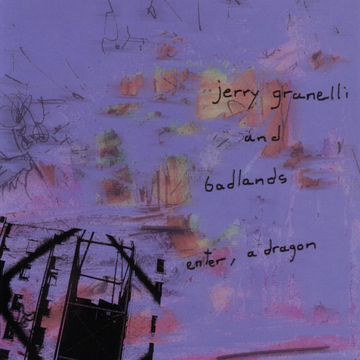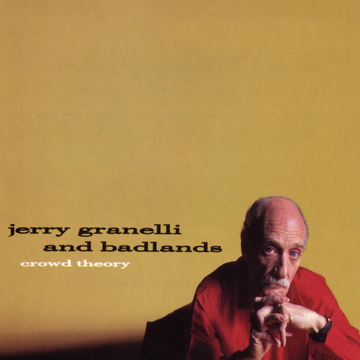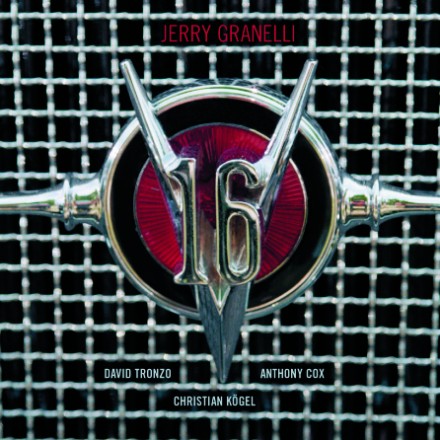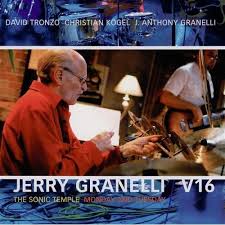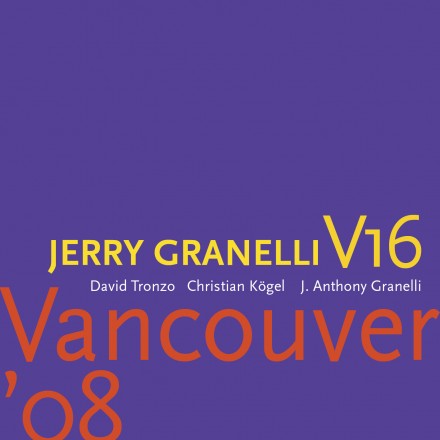Jerry Granelli, words by Rinde Eckert
Sandhills Reunion
SGL SA1553-2“Driven by Granelli’s melodic, talking, singing, orchestrating drums and his vivid penetration into the music that can be found in any sound, shape, texture or colour, they improvised like gods.”
—Stephen Pedersen, Halifax Chronicle Herald
Jazz and the spoken word have been linked at least since the Beats. Jerry Granelli was an aspiring teenage drummer in San Francisco in the late 50s, when Ginsberg, Ferlinghetti, Rexroth and Patchen declaimed to the accompaniment of local players in clubs like the Cellar and the Blackhawk, and he got to improvise a bit with most of them. In the late 70s at the Naropa Institute in Boulder, where he founded the music department, Granelli often collaborated with Ginsberg, Burroughs and Anne Waldman in improvised concerts. His fascination with words led to the 1993 jazz instrumental CD A Song I Thought I Heard Buddy Sing, inspired by Michael Ondaatje’s experimental novel about Buddy Bolden, Coming Through Slaughter. His new project Sandhills Reunion is a multi-layered interweaving of words and music that Granelli calls an audio movie or play.
The text, written and performed by actor/playwright/singer Rinde Eckert, is a glancingly linked sequence of reflections, imaginings, internal monologues and one historically accurate dialogue (“Twenty Questions for an Outlaw”) using the persona of Billy the Kid as a thematic touchstone and the Sandhills region of northwestern Nebraska as the landscape of memory and desire. By turns rowdy, comic, ironic, nostalgic, angry and melancholy, it presents the unnamed speaker’s inner life in the context of American reality and myth (complete text included in the booklet). The music, composed and played by a newly formed ensemble of trusted Granelli collaborators, counterpoints and boldly colours the words with its timbres and rhythms. It conjures up its own “locations” within the band’s collectively imagined synthesis of blues, jazz, rock, funk, ambient, folk, country, the popular and the more esoteric music of the 20th century – from raunchy bars to uptown refinement, chamber music to the avant-garde.
From the band’s first performance to the final synthesis of music and text took 21/2 years. Jerry comments: “I knew that to get the sound I wanted we’d need Lee Townsend to produce the work. We discussed the overall concept, basically recording it like shooting a film — just gathering material, then putting it all together in the mix. I asked the members of the band to write — not specifying what to write, but implying what I was hearing. I didn’t write a lot of music myself but was kind of the vision holder, maybe the director, always working with Lee. The next step was finding the text, the voice. I’ve had a long relationship with Rinde. I’d originally planned to use Ondaatje excerpts, but in the end Lee suggested that Rinde could create a new text for the project… The musicians never heard any texts. Part of the reason for this is that I wanted the music to stand alone, not as a servant to the words. The idea was that we would have two strong elements that come together to produce a third thing, a new form. So the listener might pay attention one time to the music and next time to the text, and once to the feeling of both.” (The SACD surround mix literally adds another dimension, suspending the listener within the aural web of musical and vocal associations.)
Rinde adds: “I had just come back from a residency in Nebraska when I started to write. Images of the Sandhills were still fresh, in particular the roundup and branding in which I’d taken part. I remembered my boyhood fascination with cowboys. But, of course, I was out of place. I suppose the appearance of Billy the Kid in that prairie heartland could be seen as a metaphor for my own youthful memories and my enduring sense of alienation and dislocation in this culture. Whatever the nature of the psychological ground, this poetic conceit was fertile. I could imagine a rancher, in his proper place, at home with his wife, his responsibilities, his particular fate, dreaming of a kind of powerful other self, at home in the world, errant, romantic, or alien. This irony seems consistent with the music, with its urbane wit and its kind of formal simplicity and beauty.”
For more information: rindeeckert.com
“…another striking album from the Canadian label Songlines…The album features the words and spoken voice of Rinde Eckert against a richly textured ensemble including clarinets (François Houle and Sanctuary’s Jeff Reilly) and cello. Granelli traces the project back to older collaborations with writers such as Allen Ginsberg and Anne Waldman, but Sandhills Reunion has a contemporary sound, with echoes of Dana Bryant, and Mike Ladd and Vijay Iyer’s In What Language. Eckert acts out his texts with a North-American nonchalance that conjures up open prairies and claustrophobic, trigger-happy cowboy bars. There’s something about a certain electric guitar sound that says ‘Wild West’, and Christian Kôgel does all the right Cooderish, Frisellian things in a nicely judged soundscape produced by Lee Townsend. I sometimes use the term ‘chamber jazz’ for albums like these, by which I mean a lineup that incorporates trained and intuitive musicians, partly improvising, partly reading from scores, not bound by the conventions of jazz solos or cliched licks, nor limited to mere marks on paper. But ‘chamber jazz’ can also lead to a kind of gloomy euro-waffle that goes nowhere. On Sandhills Reunion, where the musicians compose underscores for Eckert’s narrative, the tension never slips. Listen to Like a Ghost in the Grass, or 20 Questions for an Outlaw, or Last Light, which all deal with the story of William Bonney, aka Billy the Kid, from different perspectives. Eckert’s words are thoughtful and multilayered. On Your Voice he lets rip with similes that Beefheart might appreciate: ‘Your voice is like a spade shoved into packed sand/ Like decals torn from a foot locker/ Your voice smoulders like Bibles in a burned church.’ ” – John Fordham, The Guardian
**** – James Hale, DownBeat
“[Granelli] lays down the rhythms for a potpourri of acoustic-electric tunes structured upon medium-tempo rhythms and jazzy dreamscapes… And while humor and wit comprise a portion of these works, [Eckert] communicates a dappled view of humanity, spanning situations that seemingly occurred during the 1930s and onward. The band delves into a Chicago blues motif and much more throughout this undeniably attractive outing that moves forward with a cinematic flair. It’s easily one of the more refreshing and insightful jazz-tinged efforts of 2005.” – Glenn Astarita, AllAboutJazz.com
“Granelli’s music…has a spare, windswept quality well suited to Rinde Eckert’s plainspoken words…” A Minus – Tom Hull, Village Voice
“…this journey takes the listener through a linked sequence of internal monologues…The tracks flow so well together that it is impossible to skip or reroute a cut…Granelli and the band really shine behind Eckert’s words, leaving perfect space for story…[but] Eckert really steals the show…His stories are some of the most vivid and amazing tales put to record recently.” – Ryan McDermott, One Final Note

